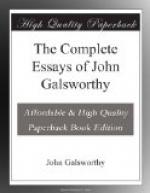And at once, as if he had released something in our souls, we all (save two or three) broke out. It wouldn’t do! It wasn’t safe! Seeing what these women were! It was exactly as if, without word said, we had each been swearing the other to some secret compact to protect Society. As if we had been whispering to each other something like this: “These women—of course, we need them, but for all that we can’t possibly recognise them as within the Law; we can’t do that without endangering the safety of every one of us. In this matter we are trustees for all men—indeed, even for ourselves, for who knows at what moment we might not ourselves require their services, and it would be exceedingly awkward if their word were considered the equal of our own!” Not one of us, certainly said anything so crude as this; none the less did many of us feel it. Then the foreman, looking slowly round the table, said: “Well, gentlemen, I think we are all agreed to throw out this bill”; and all, except the painter, the Jew, and one other, murmured: “Yes.” And, as though, in throwing out this bill we had cast some trouble off our minds, we went on with the greater speed, bringing in true bills. About two o’clock we finished, and trooped down to the Court to be released. On the stairway the Jew came close, and, having examined me a little sharply with his velvety slits of eyes, as if to see that he was not making a mistake, said: “Ith fonny—we bring in eighty thix bills true, and one we throw out, and the one we throw out we know it to be true, and the dirtieth job of the whole lot. Ith fonny!” “Yes,” I answered him, “our sense of respectability does seem excessive.” But just then we reached the Court, where, in his red robe and grey wig, with his clear-cut, handsome face, the judge seemed to shine and radiate, like sun through gloom. “I thank you, gentlemen,” he said, in a voice courteous and a little mocking, as though he had somewhere seen us before: “I thank you for the way in which you have performed your duties. I have not the pleasure of assigning to you anything for your services except the privilege of going over a prison, where you will be able to see what sort of existence awaits many of those to whose cases you have devoted so much of your valuable time. You are released, gentlemen.”
Looking at each, other a little hurriedly, and not taking too much farewell, for fear of having to meet again, we separated.
I was, then, free—free of the injunction of that piece of paper reposing in my pocket. Yet its influence was still upon me. I did not hurry away, but lingered in the courts, fascinated by the notion that the fate of each prisoner had first passed through my hands. At last I made an effort, and went out into the corridor. There I passed a woman whose figure seemed familiar. She was sitting with her hands in her lap looking straight before her, pale-faced and not uncomely, with thickish mouth and nose—the woman whose bill we had




